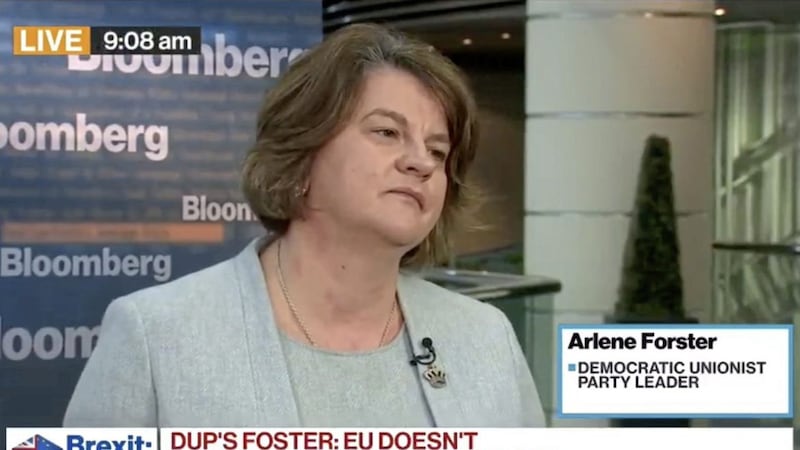A WEEK ago yesterday Arlene Foster made a highly-anticipated return to the RHI inquiry. It was billed as one of the most important moments of her political career, a make or break point that would define her future trajectory as leader. In the end, the former first minister's oral evidence proved to be something of an anti-climax, not so much a damp squib as a slowburner, the significance of which will only become fully apparent when digested and contextualised alongside other witnesses' evidence.
A week on from potentially staring down the barrel of a gun, the DUP leader appeared at the Tory party conference in Birmingham yesterday with her full armoury blazing.
She took aim at the Good Friday Agreement and again torpedoed the notion of a 'border in the Irish Sea', demonstrating how trolling can provide a useful obfuscation when substance is in short supply. There was little context to her claim in an interview with the Daily Telegraph that the 1998 accord may need to evolve post-Brexit but it nevertheless elicited a storm of condemnation, the loudest of which arguably came from Sinn Féin, fellow signatories to the St Andrews Agreement, which modified aspects of its predecessor.
- Leading article: Core principles of Good Friday Agreement cannot be abandoned
- Arlene Foster's Good Friday Agreement comments 'reckless', says Mary Lou McDonald
- Widow says Arlene Foster's GFA comments are 'disrespectful' to victims
Mrs Foster clearly sees Brexit as her Waterloo, a last chance opportunity to revive a career that hangs in the balance.
With the fallout from RHI and Stormont's suspension, the former first minister's strength may be greatly diminished but she recognises that the DUP continues to wield unprecedented power at Westminster, which is enabling the party to steer the course of the UK's withdrawal from the EU. But while she may have a hand on the steering on the wheel, the route map is unclear.
The DUP's insistence that there can be no divergence between Northern Ireland and Britain, severely limits Theresa May's potential for compromise, and means she is unable to countenance the EU's backstop without sacrificing the confidence and supply deal that keeps her government alive.
To add weight to the DUP's bargaining position, Mrs Foster is also keeping Boris Johnson onside, stressing that the agreement brokered last year is with the Tory party rather than Mrs May, and will prevail regardless of whoever occupies No 10.
In a fortnight's time, it is hoped Britain will present some workable proposals to the EU that will form the basis of a withdrawal agreement but with Theresa May being pulled in opposite directions, it's difficult to see how that's possible.
The DUP leader's Union flag-waving bravado may briefly arrest her declining credibility among the party faithful but it's a strategy that appears to be directionless and destructive, and one that serves only to exacerbate the north's internal divisions, as well as damaging north-south and east-west relations.
The success of the Good Friday Agreement came from its recognition of the need to compromise and the necessity to share power. As Brexit approaches it appears the overriding desire to cling onto power at all costs is in danger of damning us all to decades of instability.
Read more:
- Michelle O'Neill: Citizens' rights should be protected after Brexit
- Arlene Foster has 'concerns' over Philip Hammond's no-deal Irish border plan
- We will never allow a border down Irish Sea, says Bradley








